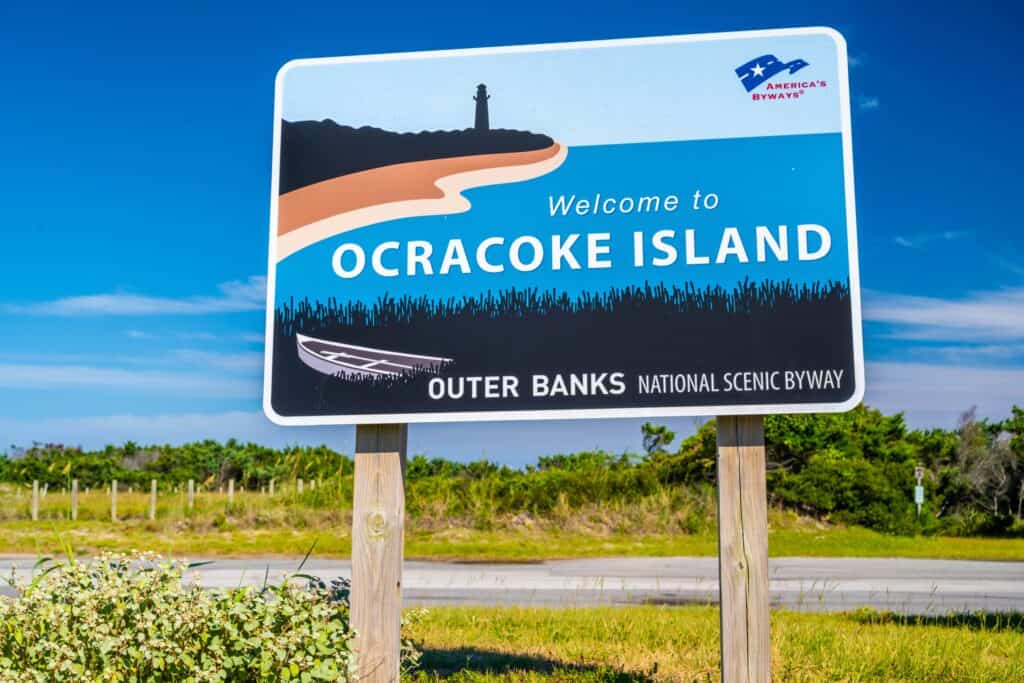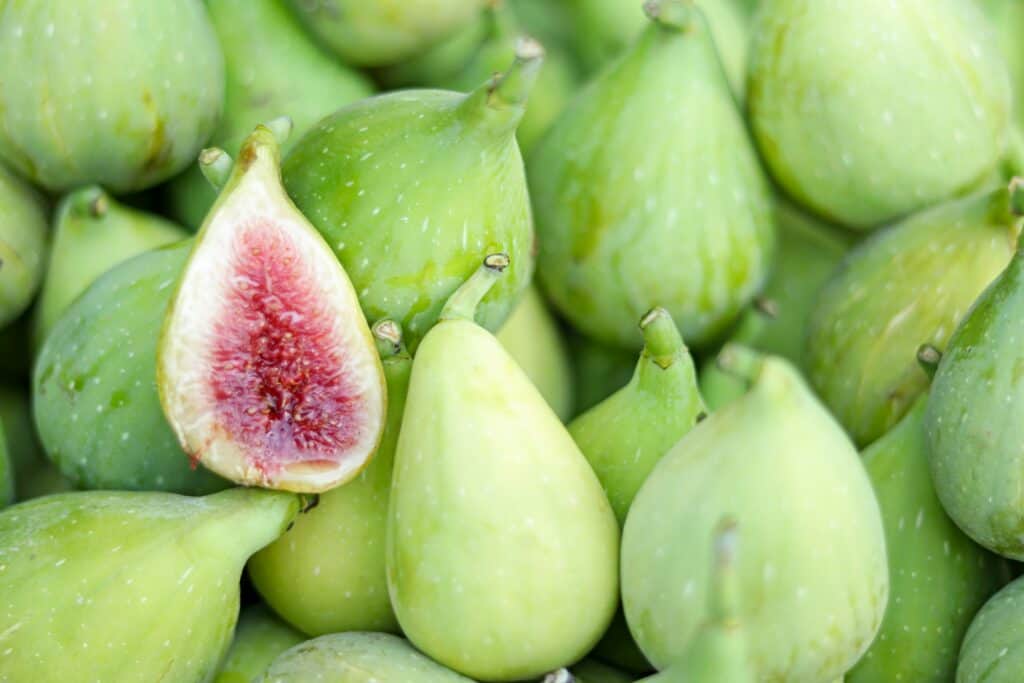
Aerial view of Ocracoke Lighthouse on Ocracoke Island, North Carolina. (Chansak Joe/Shutterstock)
On NC’s Ocracoke Island, a unique form of English called “Hoi Toider” is still spoken. Discover the history of this ancient dialect and its uncertain future.
If you’re planning a trip to Ocracoke Island, you’ll probably want to pack all the classic North Carolina seaside essentials: floppy hats if the weather is sunny, cozy sweaters for a winter getaway, sunglasses, plenty of sunscreen, shoes to wear on sandy terrain, and a cooler full of snacks and drinks. But you may also need one more thing: a dictionary, for translations. That’s because Ocracoke Island is home to its own unique dialect, which has been preserved for over three hundred years.
This dialect is known as “Hoi Toider,” also known as Ocracoke brogue. Since the arrival of English, Scottish, and Irish immigrants in the 1600s, Ocracoke, as a relatively isolated island in the days before electricity, developed a unique culture and way of speaking—one which has fascinated historians and linguists alike.
The name “Hoi Toider” is actually the brogue’s version of “high tider” (try pronouncing it for yourself and you’ll see), as in the high tides that wash up on the island’s beaches. It has been described as the only non-American dialect in the United States, or even “the last British accent in America.” But where did it come from? And how did a unique way of speaking survive over the centuries? Read on to find out more.

Outlaw’s language, or the words of Shakespeare?
Ocracoke Island is located off the coast of North Carolina. Although it’s connected to the rest of the Tarheel State by regular ferry service today, it was a remote community for hundreds of years.
The first English speakers who arrived on the island were on a mission requested by Sir Walter Raleigh and his crew in the 1500s, although they only stayed long enough to repair their ship, which had been damaged by a storm. Small groups of English, Scottish, and Irish settlers would make their homes on the island throughout the 1600s. It wasn’t until the 1700s that there were permanent enough permanent Anglophone residents on the island to constitute a town—many of whom were on “the wrong side of the law,” as difficult-to-police Ocracoke Island became a haven for pirates, including the notorious Edward “Blackbeard” Teach. In fact, the permanent settlement on Ocracoke, founded in the eighteenth century, was led by pardoned former pirate William Howard, who had once served as Blackbeard’s quartermaster.
So, is Hoi Toider a pirate’s tongue, which we should all be speaking on September 19, aka Talk Like a Pirate Day? Well, yes and no. While the Hoi Toider dialect does bear some resemblance to the way Blackbeard might have spoken in the eighteenth century, that’s not all there is to it. The settlers from the 1600s would have spoken their own regional dialects, including Scottish and Irish forms of English, which were added to the mix that would become Hoi Toider, as well as the “West Country” variety of English accent. The result was something a little bit British, a little bit American, and thoroughly Ocracoke Island.
Moreover, some linguistic historians have reason to suspect that Hoi Toider is one of the closest existing forms of English to Elizabethan English, which is how Shakespeare himself might have spoken. There are words in Hoi Toider (like “quamish” for feeling sick to your stomach) that date back to England in the 1500s and were preserved by the island’s isolation, remaining spoken on Ocracoke Island while they had otherwise faded into the annals of history.
When a brogue is more than a way of speaking
While the Hoi Toider dialect is one of the most obvious things to a visiting “dingbatter” (that’s Hoi Toider for someone from off-island) that make Ocracoke Island unique, it’s far from the only one. The close-knit Ocracoke Island community has developed its own distinct culture—one that goes beyond language.
For instance, one of the island’s signature dishes is fig cake, a rich, fruit-filled dessert that takes advantage of the fruit from the fig trees that dot the island, some of which are hundreds of years old. Ocracoke Island’s traditional cuisine relied heavily on making do with what the island could provide, alongside the islanders’ own resourcefulness, as it was highly difficult to obtain groceries from the mainland, especially before the ferry service was introduced in the 1930s. Today, while ferry service is highly reliable, islanders still love fig cake, whether made at home or at local spots like the Fig Tree Bakery & Deli.
While old-school Ocracoke Islanders (or “O’cockers,” as they sometimes refer to themselves) might build up an appetite for fig cake with a game of “meehonkey,” the local form of hide-and-seek, visitors can explore the island for themselves before a meal of local seafood, including the famous oysters. Tourism is welcome on Ocracoke, and visitors can even stay at Blackbeard’s Lodge, a historic waterside hotel featuring a pool, cozy boutique rooms, and family-size apartments available to book.

An endangered language that’s still growing
Hoi Toider has always been a relatively rare dialect, due to its origins on a single, isolated island; however, it has also recently become an endangered one. As Ocracoke Island has developed closer ties to the rest of North Carolina, and more and more people have come to visit or even stay permanently, Hoi Toider is shifting and becoming less commonly spoken, especially among younger islanders, who are increasingly likely to have accents closer to those of mainland North Carolinians.
Scholars are troubled by the possibility that the Ocracoke brogue will either vanish or be altered to the point that it’s no longer Hoi Toider as it is currently understood. However, locals don’t seem to be fighting the changes. Instead, there’s an almost philosophical attitude towards the changing tides (if you’ll pardon the pun), with many regarding the change as inevitable. Hoi Toider has always been an anomaly born out of circumstance and chance, with words, phrases, and the distinctive accent coming about as a result of different people arriving on the island. If Hoi Toider continues to change because of more Standard English speakers arriving, well, isn’t that change part of the tradition too?
This article first appeared on Good Info News Wire and is republished here under a Creative Commons license.
Related: 8 reasons why fall is the best time to visit the Outer Banks

Here’s which western NC towns landed among 6 most ‘idyllic small towns’ in NC
A new list of six "idyllic small towns" in North Carolina included several in the state's western region. Here's what to know about them. A new list...

Street newspaper lets Asheville homeless people tell their stories
A groundbreaking street newspaper is made and distributed by Asheville homeless people and other folks experiencing deep poverty. This is the story...

Buddhist monks’ ‘Walk for Peace’ arrives in Washington
The Buddhist monks have become fixtures on social media, along with their rescue dog Aloka, as they traveled to Washington, DC. Their trek included...

Buddhist monks’ ‘Walk for Peace’ arrives in Washington
The Buddhist monks have become fixtures on social media, along with their rescue dog Aloka, as they traveled to Washington, DC. Their trek included...

New J. Cole album is packed with Fayetteville references
The Grammy-winning rapper—and Fayetteville native—J. Cole has returned with a new album. It's loaded with local references. Fayetteville has been at...




